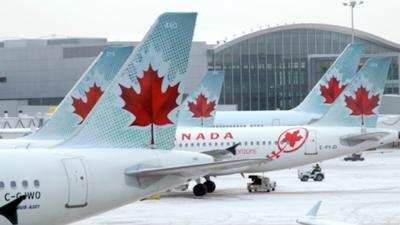Canadian Verdict Provides Passenger $1,216 for Trouble
Air Canada found out the hidden costs of entrusting its customer service to a bright-but-maybe-not-too intelligent AI assistant when a court found they remained liable for the virtual employee's promises.

A passenger researching the carrier's bereavement travel policies used the Air Canada customer service chatbot, an "artificially intelligent" Large Language Model that's currently in vogue across the IT industry. The 'agent' sent Jake Moffatt to a landing page outlining the carrier's policies, but failed to accurately convey them when he inquired about the ticketing process. Moffatt's grandmother had recently passed, and he wanted to avail himself of Air Canada's special ticket fares extended to those attending the death of an immediate family member.
Navigating the most quick and streamlined way to make the fare, Moffatt enquired on the Air Canada website, where an automated company chatbot took up his issue with aplomb. The virtual agent advised him that he could get the special bereavement ticket rate after the fact, allowing him to book a ticket at full price today and obtain a refund on the difference ($880 CAD) within 90 days. Air Canada's actual policy is less forgiving, requiring the special rate to be negotiated at time of purchase. Moffatt was understandably displeased, and didn't accept the carrier's 'get-out-of-our-hair' offer of a $200 coupon.
He pressed charges in Canada's Civil Resolution Tribunal, arguing that the AI agent was acting as a representative of the carrier, therefore they should abide by the promises it makes. Luckily he retained screenshots of what the chatbot claimed, allowing him some evidence in the case. Air Canada argued that Moffatt simply failed to read the links the agent provided, which would have spelled out the actual policy he wanted to buy tickets under. They further argued that "the chatbot is a separate legal entity that is responsible for its own actions", treating it more like a rogue contractor than a public-facing arm of the airline.
Tribunal member Christopher Rivers said the defense was unusual in an opinion that laid out a victory for Moffatt.
"Air Canada argues it cannot be held liable for information provided by one of its agents, servants, or representatives – including a chatbot. It does not explain why it believes that is the case. In effect, Air Canada suggests the chatbot is a separate legal entity that is responsible for its own actions. This is a remarkable submission. While a chatbot has an interactive component, it is still just a part of Air Canada’s website. It should be obvious to Air Canada that it is responsible for all the information on its website. It makes no difference whether the information comes from a static page or a chatbot."
Rivers continues, calling into question the disparate levels of trustworthy data found on the corporate site. "I find Air Canada did not take reasonable care to ensure its chatbot was accurate. While Air Canada argues Mr. Moffatt could find the correct information on another part of its website, it does not explain why the webpage titled “Bereavement travel” was inherently more trustworthy than its chatbot. It also does not explain why customers should have to double-check information found in one part of its website on another part of its website. Mr. Moffatt says, and I accept, that they relied upon the chatbot to provide accurate information. There is no reason why Mr. Moffatt should know that one section of Air Canada’s webpage is accurate, and another is not."
Rivers goes on to note that Moffatt was diligent in acting on the bum advice given by the chatbot, proving he upheld his end of the supposed bargain in good faith. As a result, Moffatt will get a modest sum of $812.02 (Canadian, of course) for his trouble.
 ANN's Daily Aero-Term (12.13.25): Light Gun
ANN's Daily Aero-Term (12.13.25): Light Gun Aero-News: Quote of the Day (12.13.25)
Aero-News: Quote of the Day (12.13.25) NTSB Final Report: Gippsland GA-8
NTSB Final Report: Gippsland GA-8 Classic Aero-TV: Historically Unique -- Marlin Horst's Exquisite Fairchild 71
Classic Aero-TV: Historically Unique -- Marlin Horst's Exquisite Fairchild 71 Airborne 12.12.25: Global 8000, Korea Pilot Honors, AV-30 Update
Airborne 12.12.25: Global 8000, Korea Pilot Honors, AV-30 Update



